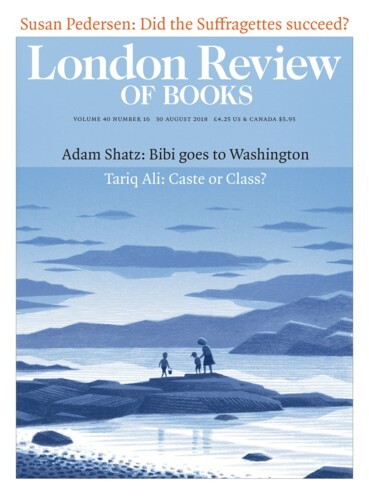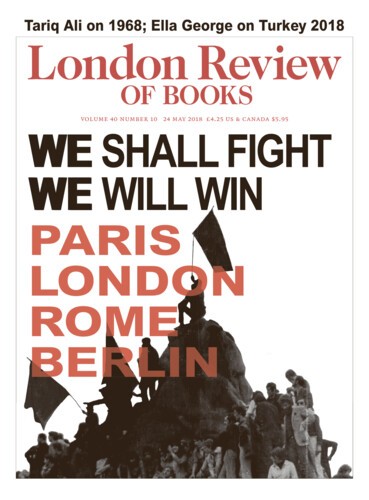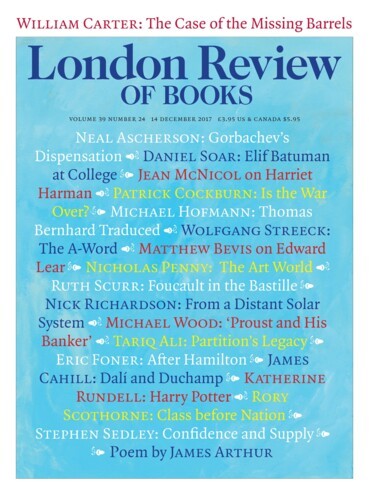Adil Ahmad Dar, the 20-year-old Kashmiri suicide terrorist who killed himself along with forty Indian soldiers at Pulwama on 14 February, will be regarded as a hero and martyr by many Kashmiris of his generation, alienated, desperate and angered by the atrocities that have been rained down on them by the Indian military on the orders of successive governments (the Congress record is appalling) for many decades. Blinding young men in Kashmir with pellet guns is an Indian innovation. Had Dar acted alone, a few might even have dared call him a hero in public. Instead an oppressive silence reigns throughout Kashmir.
Tariq Ali
Tariq Ali is the author of many books, including Street-Fighting Years, Clash of Fundamentalisms: Crusades, Jihads and Modernity, The Dilemmas of Lenin and Winston Churchill: His Times, His Crimes. He is on the editorial committee of New Left Review. He has written more than fifty pieces for the LRB, on cricket, Pakistan, Afghanistan, Kashmir, Corbyn, the Bhuttos, Victor Serge and the conflicts of recent decades. He also discussed his political formation in an interview with David Edgar.
The Unseeables: Caste or Class
Tariq Ali, 30 August 2018
Contrary to the radical slogans of the late 1940s, India’s wasn’t a ‘fake independence’. Self-rule was achieved at a high price and it meant something, but it incorporated many colonial practices. The new masters benefited, but for the untouchables, tribals and others conditions remained the same or got worse. According to recent estimates by India’s National Crime Records Bureau, every 16 minutes a crime is committed by caste Hindus against an untouchable – or Dalit, as they prefer to be called. The figures are horrific: every month 52 Dalits are killed and six kidnapped; every week almost thirty Dalit women are raped by caste Hindus. This will be a serious underestimate.
V.S. Naipaul never saw himself as just another face in the mural of 20th-century literature. The mural was, in any case, not his favourite art form. He loved and possessed a very fine collection of Persian and Indian miniatures. But this wasn’t a frame in which he saw himself either. Long before the knighthood and the Nobel Prize, it was the mirror that excited him. Destiny stared him in the face every morning. He believed in himself. The Trinidadian was to become a very fine writer of English prose.
That was the year that was
Tariq Ali, 24 May 2018
The French May erupted as we were about to launch the first issue of The Black Dwarf, which had come out looking miserabilist and unimaginative. It was generally felt that the cover was awful. We voted to pulp it and D.A.N. Jones, later of the LRB, walked out. We’d lost the editor. I was asked to take over and with the designer Robin Fior looking over my shoulder I wrote: WE SHALL FIGHT, WE WILL WIN: PARIS, LONDON, ROME, BERLIN. The vote was unanimous. We were for Utopia.
Could it have been avoided? Partition’s Legacy
Tariq Ali, 14 December 2017
In October, soon after the seventieth anniversary of Indian independence and the partition of the subcontinent, the Pakistani painter Tassaduq Sohail died in Karachi. The anniversary was celebrated with dazzling military displays: the centrepieces in both Delhi and Islamabad were nuclear missiles. Partition is history now, tales grandparents tell, but for Sohail and others who experienced...
Podcasts & Videos
Muhammad, Cervantes and the Algarve
Tariq Ali and Thomas Jones
Tariq Ali talks to Thomas Jones about a newly reissued biography of the Prophet by Maxime Rodinson, and the historic prevalence of Arabic culture in the West, from Don Quixote to Trafalgar Square.
Diary: In Pyongyang
Tariq Ali
Tariq Ali reads extracts from his diary about visiting Pyongyang.
The New World Disorder
Tariq Ali
Tariq Ali delivers his 2015 LRB Winter Lecture, in which he argues that we are living in the twilight period of democracy
Alexander Zevin talks to Tariq Ali about his new book, Liberalism at Large, a critical biography of the Economist magazine and an examination of liberalism.
Pieces about Tariq Ali in the LRB
Baseball’s Loss: The Unstoppable Hugo Chávez
Geoffrey Hawthorn, 1 November 2007
In Venezuela at the end of June, Evo Morales, Hugo Chávez and Diego Maradona, three heroes of the people in Latin America, kicked off the Copa América. Morales, pleased with his...
I prefer to be an Ottoman: Tariq Ali
Justin Huggler, 30 November 2000
No country in the Islamic world has embraced the West as eagerly as Turkey has, which makes it an intriguing setting for the third novel in Tariq Ali’s Islamic Quartet: a series of...
Acts of Violence in Grosvenor Square: Memoirs of a Revolutionary
Christopher Hitchens, 4 June 1998
I was just beginning to write about 1968 when I learned of the death in New Orleans of Ron Ridenhour, the GI who exposed the massacre at My Lai. He was only 52, which means that he was in his...
Here is a little family
Amit Chaudhuri, 9 July 1992
The narrator of After Silence is Max Fischer, the famous cartoonist. At the Los Angeles County Museum, where his work is on display, his life collides with that of Lily Aaron, a divorcee with a...
When students ruled the earth
D.A.N. Jones, 17 March 1988
Twenty years is a long time in politics. To me, the flavour of the year 1968 is still ‘anti-Fascism’. The meanings of ‘Fascism’ and ‘National Socialism’ are...
Read anywhere with the London Review of Books app, available now from the App Store for Apple devices, Google Play for Android devices and Amazon for your Kindle Fire.
Sign up to our newsletter
For highlights from the latest issue, our archive and the blog, as well as news, events and exclusive promotions.




